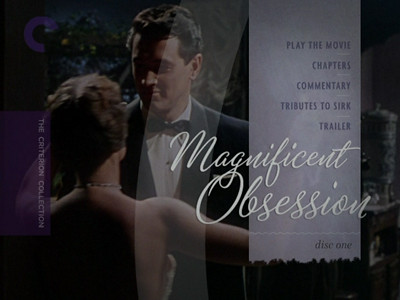
I'm man enough to admit that I got a little misty eyed multiple times during Magnificent Obsession. They don't call movies like this tearjerkers for no good reason. A film like Magnificent Obsession is made with one express purpose: to wring every possible emotion out of you that it can. That's the whole reason for watching it.
Because on paper, Douglas Sirk's 1954 remake of the Lloyd C. Douglas novel
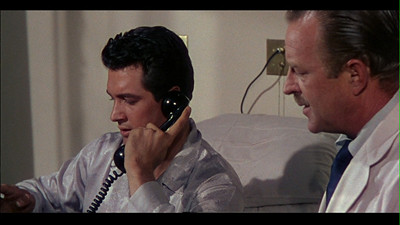
Magnificent Obsession stars Rock Hudson as Bob Merrick, a reckless playboy who likes fast machines and fast dames, and as we see at the start of the picture, he sometimes like to put those fast dames inside the fast machines and take them out for a spin at the same time. Fate has a funny way of interfering with guys like Bob. Just as the untimely death of his father--the elder Merrick was only in his 40s--put a fortune in Bob's hands and derailed his plans to follow in his father's footsteps as a surgeon, so too does a second twist of fate launch Bob back on the journey he originally intended. The millionaire flips his speed boat and nearly drowns, but a special resuscitation machine owned by Dr. Phillips, the head of the local hospital, brings the daredevil back from the brink; unfortunately, Dr. Phillips ends up needing the machine himself when he suffers a coronary, and since the key to his survival is across the lake helping Bob, he succumbs to the illness. The lout lives, the saint dies.
And as it turns out, Dr. Phillips really was a saint. His widow, Helen (Jane Wyman), is surprised by the outpouring of emotion that comes as news of the good doctor's passing spreads. These aren't just expression of thanks, but also many attempts to settle monetary debts that the indebted claim Dr. Phillips would never let them pay back. Only when the doctor's old friend Randolph (Otto Kruger) comes to pay his respects does Helen finally begin to understand. Randolph and Dr. Phillips both lived their lives according to a philosophy of giving back, what we might describe now as "paying it forward." Whatever they brought in, they redistributed to people who needed it, without taking credit for it and insisting that no repayment ever be made. By doing this, they believed they unlocked their true potential. Good things would come back on them, and they could live their lives as they were always meant to be. In Randolph's case, he finally became the painter he dreamed of being. He likens it to switching on a light.

This metaphysical turn at the center of the picture adds a surprising twist to Magnificent Obsession, though it's not that off-base when you consider that many of Douglas Sirk's films concerned themselves with the things that ailed us in modern society--albeit 1950s modern society, but the more things change, the more they stay the same, and things aren't all that different now. Which is not to say there is anything moralistic about Magnificent Obsession, and though Randolph does mention Jesus Christ as a model of how one should behave, it's the only outright mention of any religion in conjunction with this way of living. Nevertheless, Sirk does employ religious technique, including the elegiac choral swells of the Frank Skinner musical score and Randolph appearing as a kind of god on high when peering down at Bob from an observation theatre.
That technique is a means to an end, a tool of grandiosity rather than recruitment propaganda. It's in that same spirit that Bob goes through a secularized version of religious conversion when he adopts Randolph's approach. At first, however, he expects too quick a return on his investment, and his attempts to make things right with Helen causes another accident. She is struck by a passing car, and the trauma leaves her blind. Despondent and ashamed, Bob sets out to make things right, and he begins taking care of Helen in secret, including setting her up with the best doctors and wooing her under an assumed name. Even so, Bob will have to learn that until one let's go of all expectation of reward, true happiness cannot be found.
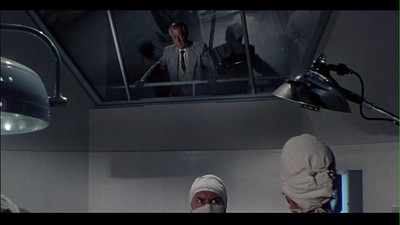
Most seasoned cinema fans will have no trouble seeing where Magnificent Obsession is going. Bob's redemption, Helen's convalescence, and the romantic outcome of their pairing are all foregone conclusions. This does not hamper one's enjoyment of this kind of film, referred to as a "woman's picture" back in its day, but rather enhances it. The expectation of any genre is that it will fulfill specific tropes. For instance, if we watch westerns, we expect that good will out and wait for the climactic shoot-out at the end; if we watch a film noir, we expect a bitterly ironic outcome, one as gray as the morality that informs it. The same with a melodrama like Magnificent Obsession: we want the happy ending. Love, flowers, the whole shebang. The audience turns to these kinds of stories to agonize over the struggle and cry for joy when it's all resolved. It's a miniature, vicarious romance that the viewer can make his or her own for two hours. It's the same reason we still watch Leo McCarey's An Affair to Remember after all these years, and that kind of shared experience is why Nora Ephron wrote Sleepless in Seattle
Sirk had a special knack for this kind of movie that really sets him apart from the pack. Honestly, I'm surprised that it took so long for this, one of his most famous movies, to come to DVD, given the 2001 mini revival that began with Criterion's previous Sirk releases (All that Heaven Allows and Written on the Wind) and Todd Haynes' note-for-note homage Far From Heaven
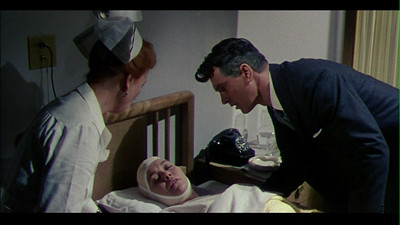
Kitsch is a word I don't think can ever be applied to a Sirk film. To do so is to adopt that demeanor I made reference to earlier, to place oneself above the material as if you are so much more sophisticated than it. I think this is what also hampers any modern attempts to revive the traditional woman's picture. Modern filmmakers are too self-aware, they believe they are making trash with the veneer of high art. Sirk never condescended to his material in that way, he always approached it with a stone-faced sincerity that gave his films the freedom to be emotional without ever once considering there might be shame in it. His characters live and breathe, and they are noble for doing so. They are human, and all the sloppy things that implies.
In fact, I'd posit this makes Sirk more self-aware than his emulators believe they are. He knew exactly what he was working with: the whole of mankind's interior existence. This meant love and spirituality were fair game, and anyone watching shouldn't blush at seeing these things on screen any more than they should blush at experiencing it in their own lives. In this way, Rock Hudson was the perfect collaborator for the director, as he was an infinitely self-assured performer, comfortable in his bulky frame, and yet still vulnerable thanks to the secrets he carried. Hudson is very good in Magnificent Obsession, breaking down the cad and rebuilding him as a man. He and Sirk give the text a pretty image, but it's never without value, there is always subtext.
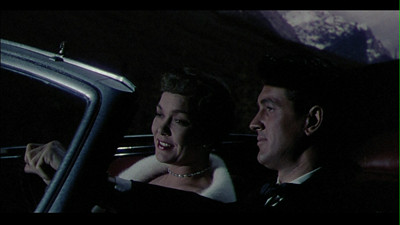
Douglas Sirk's technique is also quite difficult to match. While his films were usually set in a rural environment--in this case, in a small town on the coast somewhere near New York--he practically created an alternate reality, recreating the natural world with brighter colors and a greater sense of order. For all of his wonderful pinks and greens and oranges, though, he's also a master with shadows. Look at the darker scenes, particularly the ones in Europe when Bob rushes to Helen's side after she's told she will never see again. Sirk's chiaroscuro lighting could rival any of the great German expressionists peddling their wares in crime pictures (Sirk was a German ex-pat, as well). Compare that first rendezvous to the second reunion, to the grays and the browns of the New Mexico hospital, and the way light reenters the scene at the very end, and you'll see that Sirk's color palette has its own character arc, one that parallels the transformation of his characters.
Magnificent Obsession is not trash as high art, it's high art period. Pure and simple, free and clear. Douglas Sirk was in complete control of the cinematic canvas, and he knew where to place the right touches--a hint of music here, a pained expression there--to draw the reactions he wanted out of his audience without ever being false or manipulative. If the magnificent obsession that grips Rock Hudson in this movie is an obsession for doing good, then the magnificent obsession that grips Sirk fans is for the emotional cleansing we go through when we watch his best work. Magnificent Obsession pays it forward, and unlike the karmic build-up it simulates, it's pleasures are never used up.
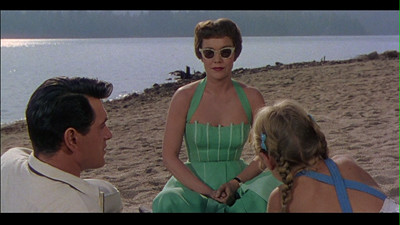
Magnificent Obsessions is a two-disc release featuring several supplemental features. The main extra on the second DVD is the 1935 version of Magnificent Obsession, directed by John M. Stahl and starring Irene Dunne and Robert Taylor. Though Stahl's later film Leave Her to Heaven

For a full rundown on the special features, read the full article at DVD Talk.

No comments:
Post a Comment